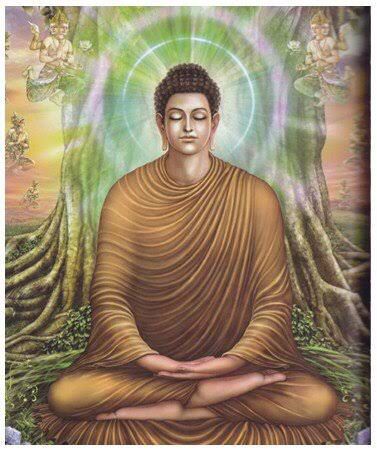

For many years he wandered all over the north of India, meeting monks and holy men who traveled around there, learning the oral traditions that spoke of reincarnation, illusion and paying for the sins of past lives (karma). When he felt that he had learned enough, he built himself a shelter on the banks of the River Nairanjana, where he lived doing penance and meditating.
His life style and will power ended up drawing the attention of other men who in their search for the truth came to him for spiritual advice. But after six long years, all that Siddhartha could notice was that his body was weaker and weaker and the constant infections did not let him meditate, as he should.
The legend says that one morning, when he went into the river to make his toilet, he no longer had the strength to rise. When he was about to drown, a tree bent down its branches and let him clutch to them not to be swept away by the current. Exhausted, he managed to reach the riverbank before fainting.
Hours later, a peasant passed by, a milk-vendor who offered him a little food. Siddhartha accepted, to the disgust of the other men who lived there with him. Believing that saint no longer to possess the strength to resist temptation, they decided to leave him immediately. But he gladly drank the milk offered him, feeling that it was a sign from God and a heaven-sent blessing.

Encouraged by the meal he had just eaten, he lent no importance to being abandoned by his old disciples; he sat himself down next to a fig-tree and decided to go on meditating about life and suffering. To test him, the god Mara sent three of his daughters to try to distract him with thoughts of sex, thirst, and the pleasures of life. But Siddhartha was so absorbed in his meditation that he did not notice any of this; at that very moment he was experiencing a sort of revelation, remembering all his past lives. As he did so, he also recalled the lessons he had forgotten (all men learn the necessary, but rarely are we are able to put to use what we have learned).
In his state of bliss, he experienced Paradise (Nirvana), where “there is no earth, nor water, nor fire, nor air, it is neither this world nor another world, and there is no sun, no moon, no birth and no death. There lies the end of all of man’s suffering.”
When that morning came to an end, he had reached the true meaning of life and become Buddha (the Enlightened One). But instead of remaining in this state for the rest of his days, he decided to go back to living among others and to teach everyone all that he had learned and experienced.

